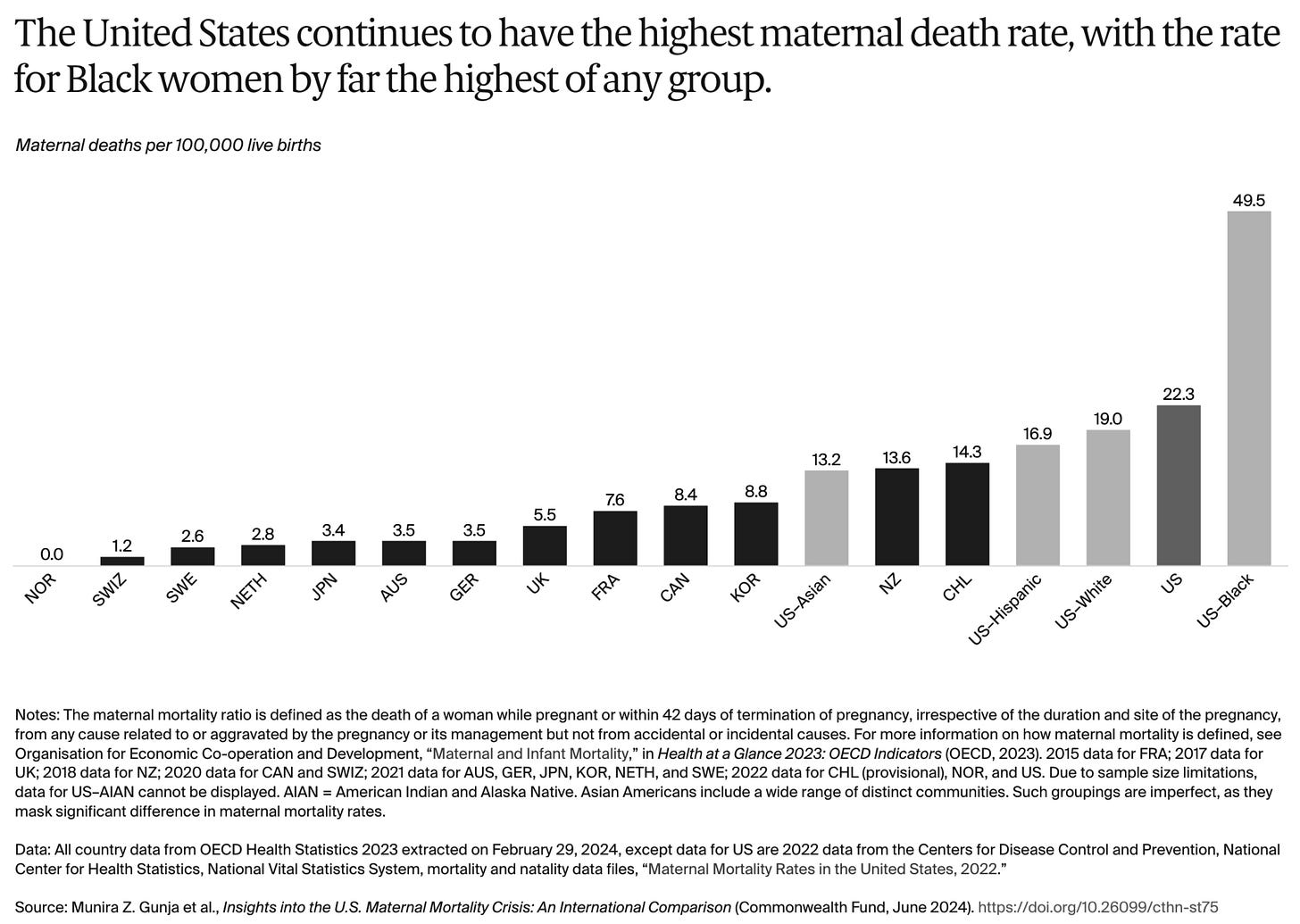By Theresa Brown
The United States has an abysmal maternal mortality rate: at 22.3 deaths per 100,000 live births, it is almost double the number of maternal deaths in the next country in line, Chile. For some perspective, consider that Norway’s rate in 2022 was 0. If you’re a Black woman in the United States, the likelihood of dying from a pregnancy-related cause is more than twice the U.S. rate overall: 49.5 deaths for every 100,000 births. And the maternal mortality rate here is getting worse, not better, which is why it’s beyond troubling that Republican legislators have called for huge cuts to Medicaid in their recent budget proposal. 41.5% of births in the United States are covered by Medicaid. Taking health care from almost half the pregnant women in this country will not end well for them or their children.
Part of the difficulty in fighting for giving pregnant women subsidized care is that Medicaid in general gets a bad rap. Unlike Medicare, which tends to be viewed as providing medical care to deserving elders who spent their lives paying into the system, Medicaid has the whiff of charity about it, and many Americans don’t like the idea of people receiving a benefit they haven’t paid for. But it doesn’t seem reasonable to assume that close to half the pregnant women in the United States are undeserving freeloaders. Perhaps in a time of rising housing costs and health insurance that, despite the promise of the Affordable Care Act, remains for many unaffordable, these are women who became pregnant and had no option but Medicaid to give their pregnancy and their growing fetus the highest quality of care available.
That’s the reality for low-income pregnant women, as I heard from Jessica and Erica, two pregnant women on Medicaid, living in Pittsburgh and receiving care at The Midwife Center (I’m using only their first names to protect their privacy). To clear up one common misconception about Medicaid recipients, both women work. Jessica, a single mom who was working and in culinary school when she became pregnant, wants to start her own catering business. When I asked her about the proposed cuts to Medicaid, she pointed out that she pays taxes and asked why she shouldn’t get Medicaid benefits. It’s a great question: Why not, indeed? “It ain’t cheap being pregnant,” she said wryly, and she’s right: The average cost of pre-natal care, labor and delivery, and post-partum care in the United States is $18,865, with out-of-pocket costs averaging $2,854.
Jessica said that getting covered by Medicaid for her pregnancy was relatively quick, but it took Erica weeks to be enrolled because she kept being asked for more information to prove she met the income requirements for Medicaid. She works as a waitress, making just $2.83 an hour before tips, and says that some days are great but “the next day I can’t pay my bills with it,” because her earnings from tips are unpredictable. Also, she previously worked a second job, and Medicaid needed her to prove she no longer had that job. “Insurance—that should be the last thing a pregnant woman should be worried about,” Erica told me. A prior miscarriage intensified her worries.
I asked both women to indulge in a macabre thought experiment: What choices would they make for their pregnancies and births if they were no longer covered by Medicaid? If for example, they found themselves in a crisis during labor that required a transfer from The Midwife Center to the hospital, and they had no insurance, what would they do? Jessica mulled the high cost of potential hospital bills and, with reluctance, imagined herself going home and hoping for the best from “a natural birth.” Erica found the question impossible to answer: “I wouldn’t know what to do in that situation. Pregnancy is scary—we can lose our life, too.”
Both women have children already, and it was obvious from talking to them that they want the best for those children and the babies they are carrying. Stripping these women of health insurance through Medicaid would force them to choose between an unmanageable level of medical debt or denying their coming child and themselves needed care, potentially endangering both their lives. That same choice would be inflicted on roughly one and a half million pregnant women in the United States every year.
In addition to the cuts to Medicaid proposed by Republicans, Health and Human Services Secretary Robert F. Kennedy Jr. has eliminated agencies that worked to improve the health of mothers and children, including the Maternal and Child Health Bureau and the Pregnancy Risk Assessment Monitoring System (PRAMS). It’s hard for me to see the endgame here, unless the goal is for more American mothers and babies to die, despite Republicans’ “pro-life” and increasingly “pro-natalist” rhetoric. Perhaps what we’re really seeing is the misogyny, the hatred of women underlying that rhetoric, exposed.
If the Trump administration and RFK Jr. really want to Make Americans Healthy Again, they need to focus on reversing America’s wretched rates of maternal mortality, not adopting policies that will cause them to skyrocket. It should be obvious that having more laboring women and their babies die will not make America great—again, now, or ever.
Theresa Brown is a nurse and New York Times bestselling author of The Shift and Healing. She has written extensively for The New York Times and other outlets including CNN.com, JAMA and Cancer Nursing Today. She is currently writing a book on finding hope in health care.






This cut to Medicaid are from the same people who restrict reproductive rights. You can't have it both ways. Again, MAGA and the Trump regime prove they are NOT pro-life.
In South Dakota the rural hospitals are discontinuing doing deliveries. The excuse they give is that they “cannot afford” to hire someone to do the few emergency c-sections so they stopped all deliveries. A woman in labor from a town in the middle of the state would have to travel 2 1/2+ hours to get to Sioux Falls or Rapid City. People with money are planning to stay near the cities around their due dates. The poor cannot afford this. This really affects the Native American population. Someone should sue the hospitals and make them do better. Norm?